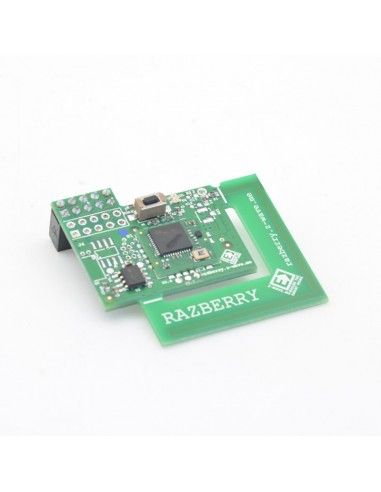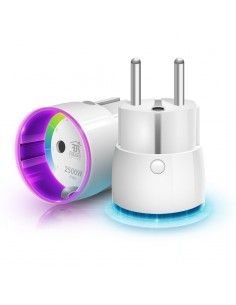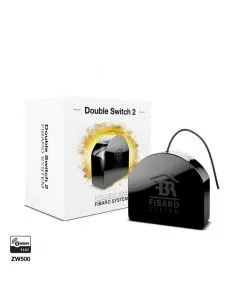- -20%
Turn your Raspberry into a Z-Wave controller
The RaZberry 2 is an expansion board that connects directly to the GPIO terminal of a Raspberry Pi (RASPBERRY_A or RASPBERRY_B). It is powered directly by the Raspberry Pi board and thus needs no external power supply.
The RaZberry 2 has an optimized antenna so that this module can now achieve a range of up to 200 meters.
The system is based on a Z-Wave Sigma Designs 5202 chip and an antenna directly integrated into the PCB. Two leds (red and green) enable information to be communicated to the user such as data transmission or the inclusion/exclusion state of the controller.
Thanks to the RaZberry 2 expansion board, you can turn any Raspberry Pi into a true Z-Wave compatible home automation box. The board is delivered with instructions enabling a software layer to be installed on the Raspberry Pi with ease. It is then very simple to control your network by a simple Javascript/Json call to the web server used by the application. All you then need to do is develop your own program to easily manage your installation!
Examples of use of this web API are provided to enable you to get started quickly.
The installation is simple. Simply connect the expansion board to the GPIO terminal of the Raspberry Pi and install the Z-Way software server. This software automatically optimises the communication with the Z-Wave chip and provides access to all functions without needing to know the low levels details of the Z-Wave communication.
Features:
- Z-Wave+ expansion board for Raspberry Pi (model A, B, or Raspberry 2)
- Create your own Z-Wave+ home automation box
- Z-Wave controller based on SDK 6.51
- Backup and recovery function, including network topology
- Extended Node Information Frame (up to 20 command classes possible)
- Optimized transmitting queue handling to speed up the transmission process
- Firmware update from the Raspberry Pi operating system
- Enhanced Wakeup notification to extend the battery life of battery-operated network devices
- Watch Dog function
- Certified Z-Wave middleware written in C (Certification number ZC10-14110009)
- Network management (include, exclude, reorganise)
- Device configuration management
- Management of direct associations between devices
- Automation engine with rules, scripts and timers with scripts in JavaScript
- The following command classes are supported: Association, Basic, Battery, Configuration, Manufacturer Specific, Meter, Multichannel, Multichannel Association, MultiCommand, NodeNaming, SensorBinary, SensorMultilevel, SwitchAll, SwitchBinary, SwitchMultilevel, ThermostatMode, ThermostatSetpoint, Version, Wakeup
- Provides a native C level API and a web-based JSON API
- Local script based on the Google V8 JavaScript Engine
- Localization based on XML language files
- Uses the Pepper One Z-Wave data base for devices
Technical specifications
- Type of module: Z-Wave+ controller.
- Z-Wave chipset: Sigma Designs ZM5202 (5th generation)
- Power supply: via the Raspberry Pi GPIO
- Frequency: 868.42 MHz
- Range: up to 200m outdoors, up to 20m inside buildings
- LED light:
- Red LED display: Inclusion and Exclusion Mode
- Green LED display: Data transmission
- Host interface: TTL UART compatible with the Raspberry Pi GPIO terminal
- Dimensions: 43mm x 42mm
- Weight: 7gr
- Compliance: RoHS, CE, FCC
- Type
- Accessory
Gateways/Antennas - Protocol
- Z-Wave Serie 500
Customers who bought this product also bought:
Lieferung und Funktion
Alles perfekt funktioniert (Lieferung) und tut auf dem Raspberry, was er tun soll.
Excellent
I use this with a Pi 4 (and previously a Pi 3) running HomeSeer.
Very reliable, stable Z-Wave network, generally responsive and good all round.
Mise en oeuvre difficile et résultat final sans appel
Tous les détails de l'opération ici : https://community.jeedom.com/t/interface-z-wave-razberry-qui-ne-fonctionnait-pas-et-mesure-niveau-du-signal-z-wave/27953
A éviter
Documentation inexistante
Conflit avec le Bluetooth du Raspberry
Porté nulle par rapport aux modules USB
Merci Swiss Domotique
Bon produits! cependant attention sur Jeedom et Raspberry Pi 3 il faut désactiver le Bluetooth pour que cela fonctionne.






















